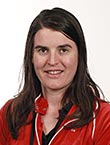Stephanie Lowry

I am a post-doctoral researcher at Mobile Robotics and Olfaction Lab (MR&O) at Örebro University. Before to joining the MR&O lab in June 2015, I completed my PhD at Queensland University of Technology (QUT) in Brisbane, Australia, and worked as a post-doctoral research at the ARC Australian Centre of Excellence for Robotic Vision at QUT. I have a Bachelors degree with Honours in Logic and Computation and a Masters degree in Computer Science from Victoria University of Wellington, New Zealand
My research focuses on the problem of visual recognition by robots in changing conditions. Powerful visual localization techniques exist for environments that remain perceptually static, but performance often degrades when the appearance of the world changes. Furthermore, perceptual changes can be universal over a region – lighting, seasonal change, and weather changes occur across large spatial areas – which means place recognition failure everywhere within a domain is possible. I’m interested in increasing the robustness of visual place recognition for robots without sacrificing autonomy. A persistent robot localisation system must operate over a wide range of different environments and under different types of environmental change, and require minimal prior knowledge or training.
A full list of my publications can be found on my Google Scholar profile.
I discuss some of my PhD research in this video:
Contact
Dr. Stephanie Lowry
AASS Research Centre
School of Science and Technology
Örebro University
70182 Örebro, Sweden
Room T1221
Phone +46 (0)19 30 13 51
stephanie.lowry@oru.se
Publications
Journal Articles
| [1] | Predicting Larch Casebearer damage with confidence using Yolo network models and conformal prediction. Remote Sensing Letters, 14(10):1023-1035, 2023 [ BibTeX | DiVA ] |
| [2] | RGB-D datasets for robotic perception in site-specific agricultural operations : A survey. Computers and Electronics in Agriculture, 212, 2023 [ BibTeX | DiVA ] |
| [3] | A Local Planner for Accurate Positioning for a Multiple Steer-and-Drive Unit Vehicle Using Non-Linear Optimization. Sensors, 22(7), 2022 [ BibTeX | DiVA | PDF ] |
| [4] | Lightweight, Viewpoint-Invariant Visual Place Recognition in Changing Environments. IEEE Robotics and Automation Letters, 3(2):957-964, 2018 [ BibTeX | DiVA ] |
| [5] | Supervised and Unsupervised Linear Learning Techniques for Visual Place Recognition in Changing Environments. IEEE Transactions on robotics, 32(3):600-613, 2016 [ BibTeX | DiVA ] |
| [6] | Visual Place Recognition : A Survey. IEEE Transactions on robotics, 32(1):1-19, 2016 [ BibTeX | DiVA ] |
| [7] | Bio-inspired homogeneous multi-scale place recognition. Neural Networks, 72:48-61, 2015 [ BibTeX | DiVA ] |
Refereed Conference and Workshop Articles
| [1] | Intention Recognition and Communication for Human-Robot Collaboration. In CEUR Workshop Proceedings, 3825:101-108, 2024 [ BibTeX | DiVA ] |
| [2] | Robust Frequency-Based Structure Extraction. In 2021 IEEE International Conference on Robotics and Automation (ICRA), pages 1715-1721, 2021 [ BibTeX | DiVA | PDF ] |
| [3] | A Submap per Perspective : Selecting Subsets for SuPer Mapping that Afford Superior Localization Quality. In 2019 European Conference on Mobile Robots (ECMR) 2019 [ BibTeX | DiVA | PDF ] |
| [4] | Similarity criteria : evaluating perceptual change for visual localization. In 2019 European Conference on Mobile Robots (ECMR) 2019 [ BibTeX | DiVA | PDF ] |
| [5] | Improving Localisation Accuracy using Submaps in warehouses. 2018 [ BibTeX | DiVA | PDF ] |
| [6] | LOGOS : Local geometric support for high-outlier spatial verification. , pages 7262-7269, 2018 [ BibTeX | DiVA ] |
| [7] | Visual place recognition techniques for pose estimation in changing environments. In Visual Place Recognition: What is it Good For? workshop, Robotics : Science and Systems (RSS) 2016 2016 [ BibTeX | DiVA | PDF ] |
| [8] | Building Beliefs : Unsupervised Generation of Observation Likelihoods for Probabilistic Localization in Changing Environments. In IEEE International Conference on Intelligent Robots and Systems (IROS), IEEE, 2015, pages 3071-3078, 2015 [ BibTeX | DiVA ] |
| [9] | Distance metric learning for feature-agnostic place recognition. In Proceedings of the 2015 IEEE/RSJ International Conference on Intelligent Robots and Systems (IROS), pages 2556-2563, 2015 [ BibTeX | DiVA ] |
| [10] | Sequence Searching With Deep-Learnt Depth for Condition- and Viewpoint-Invariant Route-Based Place Recognition. In 2015 IEEE Conference on Computer Vision and Pattern Recognition Workshops, pages 18-25, 2015 [ BibTeX | DiVA ] |
Find the complete BibTeX record here.
